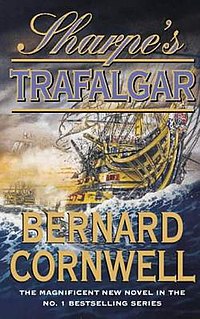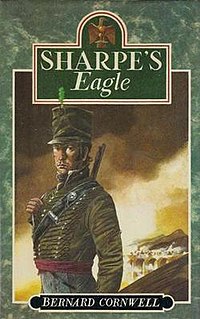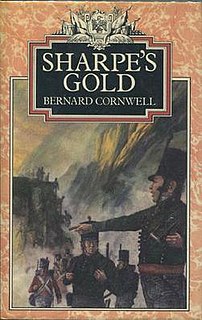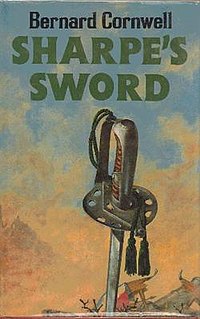Plot summary
While lost near the Spanish-Portuguese border, Sharpe and his company surprise a group of French soldiers in unusual grey uniforms, caught in the act of raping a teenage Spanish villager. They kill some Frenchmen and take two prisoner. During a parlay, their leader, Brigadier-General Guy Loup, offers to give Sharpe safe passage in exchange for the men, but Sharpe, appalled by the rape and massacre of the other villagers, including children, orders the prisoners shot. (Loup reveals that he counters the atrocities committed by Spanish guerrillas by having his men commit more heinous ones.) Loup swears to avenge them.
Back at headquarters, Sharpe is informed by Major Michael Hogan that the Real Compania Irlandesa, the royal bodyguard of the captive King of Spain, have been sent to join Wellesley's forces. As the British wish for Wellesley to be appointed Generalissimo of the Spanish Armies, it is imperative that the unwanted soldiers be treated with honour, though they are composed of Irish exiles and their descendants (who have no love for the British due to their occupation of Ireland) and have no combat experience. Wellesley assigns Sharpe to encourage them to desert by taking them to a fort close to the French and drilling them mercilessly. There Sharpe also has to deal with former Wagon Master-General Colonel Claude Runciman, a grossly fat and indolent man.
Pierre Ducos, a French intelligence officer answering to Napoleon himself, has planted an agent within the Compania Irlandesa, Dona Juanita de Elia, a Spanish noblewoman, the mistress both of the unit's commander, Lord Kiely, and of Loup. False rumours of British atrocities in Ireland, backed up by forged American newspapers, target not only the Compania, but also the many Irishmen in the British army. Despite knowing Wellesley's intentions, Sharpe decides to turn the demoralised exiles into real soldiers. He persuades Runciman to divert arms and ammunition to the Compania, and conspires with a local partisan, El Castrador, to kill and mutilate some deserters, making it look like the French are responsible, to deter further desertions.
The Compania are joined at the fort by a Portuguese infantry battalion. Sharpe, concerned by the threat posed by Loup's personal vendetta against him, acknowledges his illegal execution of Loup's men to a few officers. That night, Loup attacks the fort, massacres the Portuguese, and is only driven off when Sharpe's friend, Tom Garrard, sacrifices himself to blow up the ammunition wagons.
Sharpe's carelessly public admission and the imminent enquiry into the disaster endanger his career. Wellesley, though reluctant, is willing to make him a scapegoat to conciliate the Portuguese. To avoid this, Sharpe attacks Loup's hideout but finds it deserted, except for Dona Juanita, who is exposed as the enemy agent, and courier of the forged newspapers. Sharpe sleeps with Juanita, and lets her go the following morning, thus frustrating Hogan's hopes of uncovering her accomplice in the Compania.
The disgraced Kiely commits suicide, and his funeral is presided over by the regiment's chaplain, Father Sarsfield. In a private conversation over the open grave, Hogan informs Sarsfield that he is aware of his treachery, but lacks proof. Sarsfield attempts to kill Hogan, but is shot by Sharpe, and buried with Kiely.
The French, led by Marshal André Masséna, prepare to cut the British off from their only route of retreat and bring Wellesley to battle.
Wellington concentrates his forces at the village of Fuentes de Onoro. Still in disgrace, Sharpe, Runciman and the Real Compania Irlandesa are assigned to guard the ammunition wagons. French assaults push the British out of the village and steadily back up a hill. Wellington releases his reserves, who drive the French back into the village. However, the British are in turn counter-attacked by the Loup Brigade. With Sharpe's encouragement, Runciman "offers" to throw the Compania into the fray. They turn the tide of battle; as the Loup Brigade falters, the French fall back, and Wellington sends his men forward, winning the battle.
During the fighting, Loup and Sharpe duel in the ford over the river. Sharpe is shot and wounded by the Dona Juanita, who is in turn killed by Harper. Despite his wound, Sharpe disarms and drowns Loup. The Real Compania Irlandese are sent to the Spanish Junta in Cadiz with honour. The case against Sharpe and Runciman is dropped, in light of their bravery and the deaths of all eyewitnesses to Sharpe's admission other than Runciman, who lies on Sharpe's behalf.

Bernard Cornwell is an English author of historical novels and a history of the Waterloo Campaign. He is best known for his novels about Napoleonic Wars rifleman Richard Sharpe. He has also written the Saxon / Last Kingdom stories about King Alfred and the making of England.
Sharpe is a series of historical fiction stories by Bernard Cornwell centred on the character of British soldier Richard Sharpe. The stories formed the basis for an ITV television series featuring Sean Bean in the title role.

Sharpe is a British television drama series starring Sean Bean as Richard Sharpe, a fictional British soldier in the Napoleonic Wars, with Irish actor Daragh O'Malley playing his second in command Patrick Harper. Sharpe and Harper are the heroes of the Sharpe series of novels by Bernard Cornwell; most, though not all, of the episodes are based on the books. Produced by Celtic Films and Picture Palace Films for the ITV network, the series was filmed mainly in Crimea, with recording of other episodes in Turkey, England, Portugal and Spain. The two final episodes were filmed in India.

Death to the French is a 1932 novel of the Peninsular War during the Napoleonic Wars, written by C. S. Forester, the author of the Horatio Hornblower novels. It was also published in the United States under the title Rifleman Dodd.

Sharpe's Havoc: Richard Sharpe and the Battle of Oporto is the seventh historical novel in the Richard Sharpe series by Bernard Cornwell, first published in 2003.

Sharpe's Rifles is chronologically the sixth, but the ninth published, historical novel in the Richard Sharpe series by Bernard Cornwell, first published in 1988.

Sharpe's Trafalgar is the fourth historical novel in the Richard Sharpe series by Bernard Cornwell, first published in 2000. It is the first of the novels in the wars against Napoleon, putting the army ensign at the Battle of Trafalgar in 1805.

Sharpe's Eagle is a historical novel in the Richard Sharpe series by Bernard Cornwell, first published in 1981. The story is set in July 1809, in the midst of the Talavera Campaign during the Peninsular War. It was the first Sharpe novel published, but eighth in the series' chronological order.

Sharpe's Gold is the second historical novel in the Richard Sharpe series by Bernard Cornwell first published in 1981. The story is set in August 1810 and features the destruction of Almeida during the Peninsular War.

Sharpe's Sword is a historical novel in the Richard Sharpe series by Bernard Cornwell. It is the fourth in the series, being first published in 1983, though the fourteenth chronologically. Set in the summer of 1812 including the Battle of Salamanca on 22 July 1812, the story follows Sharpe and his friend Sergeant Harper involved in espionage while hunting down the sadistic and highly dangerous Colonel Philippe Leroux.

Sharpe's Fury is the eleventh historical novel in the Richard Sharpe series by Bernard Cornwell, published in 2006. The story is set in 1811 during Wellington's campaign in the Iberian peninsula.

Sharpe's Escape is the twenty-third historical novel in the Richard Sharpe series by Bernard Cornwell, published in 2004. Sharpe is embroiled in the British retreat through Portugal in 1810 from the defence of the ridge at Bussaco to the Lines of Torres Vedras, where the French offensive is successfully halted.
Sharpe's Rifles is the first of the Sharpe television dramas, based on Bernard Cornwell's 1988 novel of the same name. Shown on ITV in 1993, the adaptation stars Sean Bean, Daragh O'Malley and Assumpta Serna. It began a long series of successful and critically acclaimed television adaptations of the novels.
Sharpe's Eagle is the second in the series of Sharpe historical war television dramas, based on the 1981 novel of the same name. Shown on ITV in 1993, the adaptation stars Sean Bean, Daragh O'Malley and Assumpta Serna.
Sharpe's Battle is a 1995 British television drama, the seventh of a series screened on the ITV network that follows the career of Richard Sharpe, a fictional British soldier during the Napoleonic Wars. It is somewhat based on the 1995 novel of the same name by Bernard Cornwell, though the film is set in 1813 on the Spanish-French border, rather than in 1811 on the border with Portugal.
Sharpe's Company is a British television drama, the third of a series that follows the career of Richard Sharpe, a British soldier during the Napoleonic Wars. This episode is based on the 1982 novel of the same name by Bernard Cornwell.
Sharpe's Enemy is a British television drama, the fourth of a series that follows the career of Richard Sharpe, a British soldier during the Napoleonic Wars. This episode is based on the 1984 novel of the same name by Bernard Cornwell.
Sharpe's Honour is a 1994 British television drama, the fifth of a series screened on the ITV network that follows the career of Richard Sharpe, a fictional British soldier during the Napoleonic Wars. It is based on the 1985 novel of the same name by Bernard Cornwell.

In the siege of Almeida, Portugal, the French corps of Marshal Michel Ney captured the border fortress from Brigadier General William Cox's Portuguese garrison. This action was fought in the summer of 1810 during the Peninsular War portion of the Napoleonic Wars. Almeida is located in eastern Portugal, near the border with Spain.












